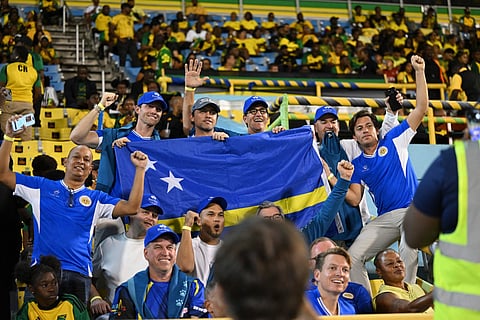A look at the smallest nations set for big stage at 2026 World Cup
Revisiting the remarkable stories of the world’s tiniest footballing nations

Dubai: Elite tournaments often produce stories that outshine even the brightest stars on the pitch. And with FIFA’s expansion to 48 teams, the 2026 World Cup is already shaping up to be a stage where football’s most inspiring underdogs step into global view.
Every four years, the conversation is dominated by the usual heavyweights — Brazil, Germany, France, Argentina. Yet the magic of the World Cup has never belonged solely to the giants. It lives in the moments when football’s lesser-known nations emerge from the shadows, reminding the world that passion can outweigh population and that the sport’s spirit knows no hierarchy.
With the tournament’s expanded format widening the global spotlight, this World Cup cycle has delivered a milestone of its own: a new record for the smallest nation ever to qualify. As qualification unfolds, it’s the perfect time to revisit the remarkable stories of the world’s tiniest footballing nations — those who dared to dream and made it to football’s biggest stage.
And this year, the narrative has already taken a dramatic turn.
Curacao
On Saturday, Curacao stunned the football world by securing its first-ever place at the World Cup — and in doing so, became the smallest nation in history to qualify.
A draw against Jamaica sealed the achievement, but the broader story is even more astonishing. Home to roughly 150,000 people, Curacao surpasses Iceland’s previous record as the least populous country ever to reach the tournament. To put it in perspective: the MetLife Stadium in New Jersey, the venue for the 2026 final, holds more than half the nation’s population.
Known more for its vibrant beaches and its namesake blue liqueur than for international football, the Dutch Caribbean island has overcome its limited talent pool by leaning on its diaspora. Many squad members were born in the Netherlands, a link formed through Curacao’s status as an autonomous country within the Kingdom of the Netherlands since 2010. That structure has helped turn the island into a rising football force — and now into a global sensation.
Haiti
Haiti’s return to the World Cup for the first time since 1974 is nothing short of extraordinary. The Caribbean nation’s qualification comes despite severe internal turmoil; gang violence now controls much of the capital, and its French head coach, Sebastien Migne, has never even managed to visit the country due to safety concerns.
Yet against all odds, Haiti’s players pushed through. Their qualification has delivered a rare moment of joy — a “moral boon,” as many Haitians describe it — to a nation in desperate need of hope. In a country where football is woven into the social fabric, this achievement has become a powerful symbol of resilience.
Cape Verde
The Atlantic archipelago of Cape Verde has punched its ticket to the World Cup for the first time, sealing qualification with a commanding 3—0 victory over Eswatini. Before Curaçao’s emergence, Cape Verde held the title of second-least populated nation ever to qualify, with about 600,000 people.
Like many small nations, it has relied heavily on its diaspora. One of its standout figures is centre-back Roberto Lopes, born in Ireland to a Cape Verdean father. The team’s rise reflects the broader strength of a global community connected by heritage, heart, and now World Cup glory.
Panama
Panama has also booked its place on football’s biggest stage, returning after its World Cup debut in 2018. With a population of just 4.5 million, the Central American nation clinched qualification with a victory over El Salvador.
After finishing bottom of its group in 2018, Panama now enters 2026 with valuable experience and a hunger to rewrite its World Cup legacy.
The qualification pathway in the Americas has opened up in part because the United States, Mexico, and Canada automatically qualified as hosts, leaving more room for smaller teams to shine. And shine they have.
Croatia
Long regarded as one of international football’s great overachievers, Croatia have reached the World Cup semi-finals in both 1998 and 2022, and were finalists just eight years ago, falling to France. In recent years their midfield has been orchestrated by Luka Modrić, whose exceptional 2018 campaign earned him the Ballon d’Or. The veteran could feature in his fifth World Cup next summer. Hoffenheim forward Andrej Kramarić was their top scorer in qualifying.
Uruguay
For a country of its size, Uruguay’s footballing legacy is remarkable. They have lifted the World Cup twice — though those triumphs came in 1930 and 1950 — and have continued to produce big performances on the world stage. They reached the semi-finals in 2010 and have long relied on stars such as Luis Suárez and Edinson Cavani. Now under the guidance of former Leeds manager Marcelo Bielsa, they will hope to arrive next summer in peak condition.
Qatar
Although they competed at the last World Cup as hosts, this time Qatar have reached the finals on merit. Their 2022 campaign yielded little success on the pitch, but they will be aiming for a stronger showing after navigating a demanding qualification journey that saw them finish top of a group containing the UAE and Oman.
Sign up for the Daily Briefing
Get the latest news and updates straight to your inbox






